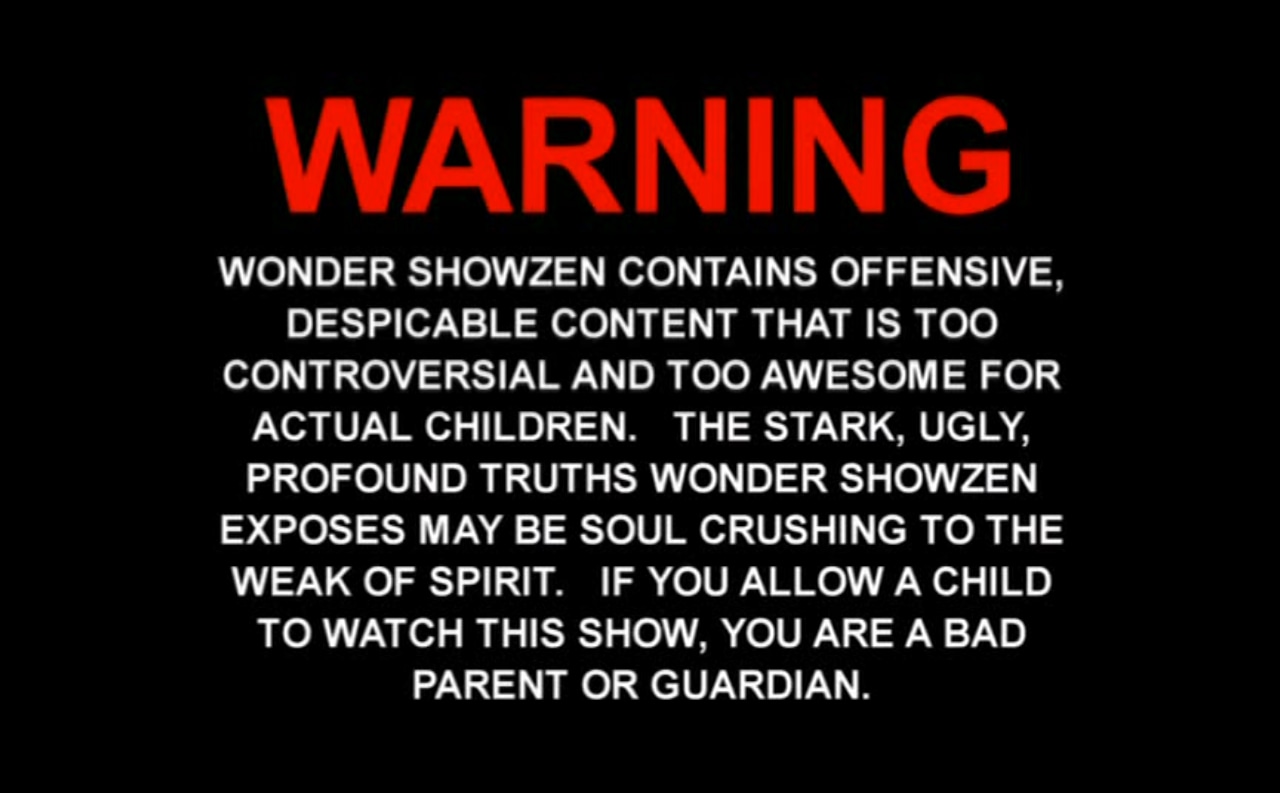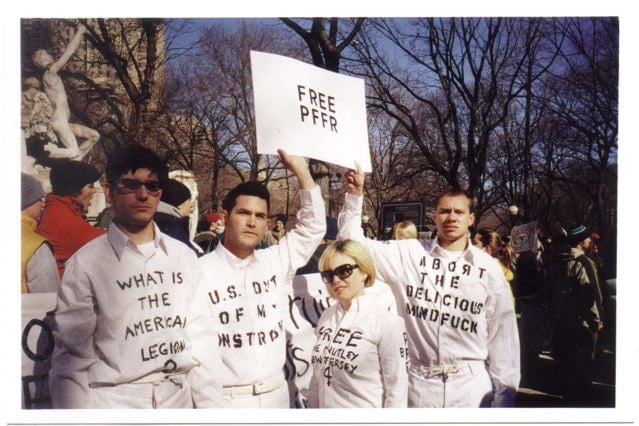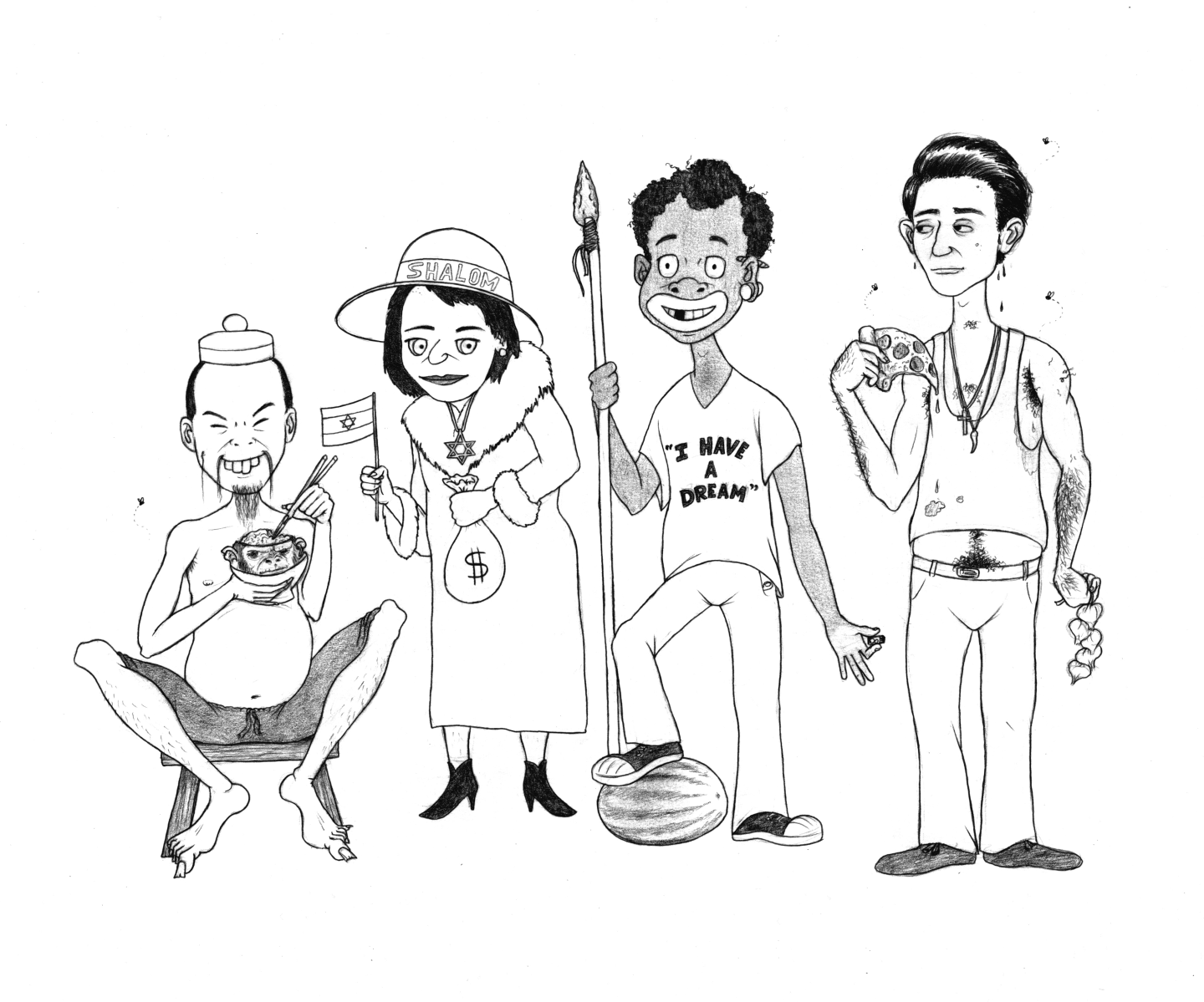 Wonder Showzen's opening disclaimer.
Wonder Showzen's opening disclaimer.
In the era of Trump, fake news, and post-truths, a late-night variety show from 2005 called Wonder Showzen feels newly vital, like the first whiff of the gas leak that continues to explode all around us. Vernon Chatman and John Lee of the New York art collective PFFR created the show for MTV2, which aired it for two seasons. It’s a photo negative of Sesame Street – an image of wholesomeness and family values flipped with belligerent on-the-street bits starring Clarence the puppet, a squad of precociously venomous reporters called the Beat Kids, and storylines starring Chauncey and his felt-covered friends that aim for sacred cows from the lowest possible bar.
Watch any TV comedy long enough, and you subconsciously pick up where its taboos are, the omnipresent line that helps define every joke. These borders never existed on Wonder Showzen. The tone was acidic, and never righteous, perhaps because it recognized that we were too far gone. Showzen had contempt for a society it saw as cruel, self-absorbed, and unsustainable, and today that feeling is shared more acutely around the world. But despite bleak (and always hilarious) screeds about imperialism, capitalism, and propaganda, a message was never prioritized over a joke. It was potty humor, if that potty was retrieved from a trash island in the pacific, or a sweatshop.
The week before PFFR’s new show Neon Joe: Werewolf Hunter premiered on Adult Swim, Chatman and Lee spoke to The FADER over the phone about the show’s history and legacy.
The FADER: How long did it take for you guys to establish a creative rapport?
VERNON CHATMAN: We met in this chemistry class and accidentally glued every part of our bodies together. So, we got to know each other through that process.
JOHN LEE: I think we came up with the idea for what was then called Kids Show within days of meeting each other?
VERNON CHATMAN: Probably, yeah.
Do you remember what you were doing?
CHATMAN: Getting a two pound bag of free Skittles for signing up for a Wells Fargo Bank account.
LEE: We were waiting in that line and started singing the Kids Show theme song.
CHATMAN: The original show was supposed to be 20 minutes of the intro song and then one minute of the show.
LEE: Yeah, just all intro, and then you tease the audience.
Who was your biggest teacher?
CHATMAN: Gordon Lish, the former fiction editor of Esquire. That's the source of it all. Tedium is one of his primary weapons.
LEE: He'll spend about ten pages on setup and then give you the lamest, dumbest punchline, or it's like some sort of shit joke, which is always the best.
Did that prompt you at all to start thinking about the entitlement that we have as consumers of entertainment, and what creators give them in return?
LEE: Just right now is the first time I've thought about that.
Ah, shit.
CHATMAN: Yeah, that sounds like an excuse to me.
LEE: A lazy man's excuse.
CHATMAN: Yeah. If you're going to be obnoxious to your audience, don't dress it up in pretension. Just own it.
LEE: We wear our obnoxious on our sleeve.
CHATMAN: Yeah.
 PFFR. From left to right: Jim Tozzi, John Lee, Alyson Levy, Vernon Chatman.
Courtesy of John Lee
PFFR. From left to right: Jim Tozzi, John Lee, Alyson Levy, Vernon Chatman.
Courtesy of John Lee
I feel like comedy is seems pretty impotent right now. At best it can describe the nightmare, but it certainly can’t influence it.
How did you feel about the comparisons to Sesame Street?
LEE: We can say we're the Sesame Street generation. I wasn't secure with it until right now.
CHATMAN: There's nothing about the Wonder Showzen that was like, "we're going to really stick it to Sesame Street," which was genuinely funny and a Trojan Horse to education through that comedy. We just thought, “What if we Trojan Horse-d garbage and cold, important truths on fire?” It's just like a fun way to fuck with expectations.
LEE: Yeah. If you really hate TV, don't make TV. A lot of times the jokes were fuelled by hate and frustration and anger, but the biggest motivation was what was funny and enjoyable.
CHATMAN: I never associated anger or frustration with the truth that we were "telling." I always thought that it as more gleeful than angry. There were always people like, "Oh you guys are angry young men, or whatever." And I'm like, "No, I just thought it was fun to say these things."
There was a certain political climate around the time of the show's production that seemed to influence the show.
LEE: Yeah. At the time we thought the worst thing that could ever happen was Bush being re-elected. It happened in the beginning of the second season, and it felt like the bottom dropped out. We were going to have a bit where the letter W was shot [a reference to George “W.” Bush] and replace the letter [in the alphabet].
CHATMAN: I think it ended up getting impeached.
Did MTV kill that skit?
CHATMAN: I think we probably killed it. MTV didn’t kill much. We figured out pretty quickly how to ride the line and then how to make friends. How to make your problems [into] their problems, and their problems [into] your problems.
One of the reasons that I wanted to set up this interview was this crazy moment of kismet I had watching Wonder Showzen. In the episode with the Beat Kids Wall Street segment, a cartoon follows and a fart says “Remember kids, egalitarian communes breed dissonance.” That pair of skits predicted the history of Occupy Wall Street years before it happened.
LEE: Our attitude also was, “They're going to take this show away any second. So we're going to just do everything, we're going to get away with as much as we can, while we can.” And I just think it's weird that people don't do that. There's so much shit that's just never said on TV, everybody's cooperating in this one game and one agreed upon thing.
[Wonder Showzen] is mostly just from a place of just like glee and comedy. But I do think it's kind of incredible there isn't more like, hardcore and even stupid attacking on fundamental assumptions of what is going on in the world and in the culture. Especially with all these new outlets.
But there’s been an ultimate co-opting, too. The president now takes comedic license for the most serious shit imaginable. This attitude of "Hey, who gives a shit? We're going to say what we want but not be held accountable whatsoever because we're just using comedic license,” It’s kind of mind blowing that those tools were taken and now comics are left sitting there like with their dicks and their lady parts hanging out. We're the ones that are supposed to have a who-gives-a-fuck attitude because what I say doesn't matter! And now the comics are like, "Well, Jesus, if they have no reverence whatsoever, to humanity or ethics or morals or decency or democracy —
CHATMAN: “How am I supposed to take this down?”
LEE: —then yeah, then how interesting is irreverence? I feel like comedy is seems pretty impotent right now. At best it can describe the nightmare, but it certainly can’t influence it.
If you were making Wonder Showzen today, how would you approach it?
LEE: We almost did the third season where we were going to hire two kids to make the show and we were going to document their making of the third season. And on MTV1, we would show the documentary of the episode and on MTV2, we'd show the episode at the exact same time. So you could click back and forth if you wanted to. We also talked about doing Wonder Showzen movie that's just like a big old episode of Wonder Showzen, kind of how Jackass just did big old episodes of Jackass. And then we talked about doing a big Beat Kids movie.
CHATMAN: We pitched the [Beat Kids host] Trevor Hinds 20/20 series. Trevor was 11 at the time, and he was going to start campaigning until he was 35, which is the age you have to be to run for president. He would just go around go to every state and make deals, and hire the best campaign people he could get. If somebody just spent their entire life campaigning for President, he'd probably win. And then he would have the Presidency in 2028.
LEE: We would be the Steve Bannon of Trevor Hinds.
CHATMAN: They liked it but the marketing said they just didn't think politics would be that big. And then of course, two years later is Borat, and The Daily Show explodes. Corporations are just slow to see forward because they're so worried about where they are right then. They're like meerkats, constantly looking, "What's going to happen, what terrible thing's going to take us all out?"
So why didn’t the show return in any format after the second season?
CHATMAN: The changeover at MTV. They brought in new people for MTV2 and everyone was like, "What am I supposed to do with this?"
LEE: And then it just sort of quietly dissolved. I don't think anyone ever said, "Okay, you're canceled."
Do you think Wonder Showzen could still be made today?
LEE: No. We got asked to bring it back, but we couldn't make it. Could someone else make it? Sure, yeah. Go for it.
CHATMAN: The whole thing is, are you actually talking about something in a way that is humane or not? We can defend almost all the jokes from the show. But one that people would hammer on that I think had a germ of truth was when we were fucking with homeless people out on the street with the puppets. But when you're out in the city, the most common people who are out there all the time are homeless people. And the idea of ignoring them seemed more offensive, [so] we tried to treat them the same as anyone else. But it was pretty much, (a) we didn't harass homeless people or poor people any more than we would harass rich people, (b), we treat them like individuals.
LEE: We're equal opportunity assholes.
Do you think that the diversity of the show’s production staff was a factor in its success?
CHATMAN: One time the network had an issue with a cartoon or something, and they said, "Well, is one of you black? Is this offensive?" They'd never met us before. [Chatman and Lee are both bi-racial].
LEE: Diversity in the people who are writing and directing and performing and producing and casting and shooting, it helps in every step of the way. But the biggest thing that causes all that to happen and the biggest thing that prevents all that from happening is the fact that there isn't diversity in fucking executives, in the people who make the decisions of what shows to green light. Because they're afraid of exactly that question. Like, is one of you black? If there is an executive approving that script, they're literally not qualified to judge.
CHATMAN: Right.
LEE: So rather than hire a black person, who's literally qualified to do the job they’re trying to do right now, they’ll just cut the bit or just say fuck the show, forget the show. You have to have diversity among executives and among the people who make those decisions at the highest possible ranks. Because I believe in the trickle down economy.
CHATMAN: Trickle down culture?
LEE: Yeah [laughs].
 A "racist portrait" of PFFR depicting their respective stereotypes.
Courtesy of John Lee
A "racist portrait" of PFFR depicting their respective stereotypes.
Courtesy of John Lee
Thumbnail photo via Augenblick Studios on YouTube.